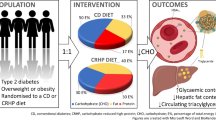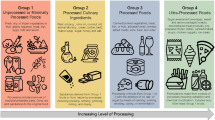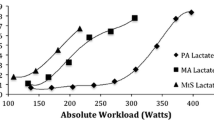Abstract
Purpose
Obesity is associated with increased risk for several metabolic diseases. Low Resting Energy Expenditure (REE) is considered a risk factor for weight gain and obesity. It was shown that diet composition can influence energy balance. Uncoupling Protein2 (UCP2) is a transporter protein presented in mitochondrial inner membrane which plays a role in cellular energy hemostasis. Our study was carried out to investigate the association between REE, diet and UCP2 in women with obesity in different REE.
Methods
A total forty nine subjects participated in the current study. Sixteen subjects with body mass index (BMI) > 30 and low REE, seventeen subjects with BMI > 30 and normal REE, and Sixteen non-obese subjects as control group. Subjects with measured REE less than 20% of their predicted REE were defined as low REE. Anthropometric, body composition parameters and REE were measured. Fasting blood UCP2 in Peripheral blood mononuclear cell (PBMC) and thyroid hormones were determined. Validated questionnaires for 24-h food records was used.
Results
There was a significant association between REE and protein intake in normal weight group (p-value = 0.03). In addition, there was a significant relationship between UCP2, protein and carbohydrate intake in group with obesity and low REE (p-value = 0.01, p-value < 0.01). After adjustment for age, fat-free mass and waist circumference, UCP2 was associated with measured REE in control group when compared to each group separately (95% CI, β = 0.42, p-value = 0.04). Furthermore there was a significant relationship between UCP2 and REE in three groups when we pooled (95% CI, β = 0.23, p-value = 0.04). Moreover, after adjustment for fat-free mass, we found, 0.15 decrease in the chance of low REE with the high level concentration of UCP2 in women with obesity (OR = 0.15, p-value = 0.04).
Conclusion
There was an association between REE, UCP2 and dietary intake (protein and carbohydrate). In addition REE was lower in some women with obesity and decreasing in the level of UCP2 protein may relate to this problem.
Similar content being viewed by others
Data Availability
Not applicable in this section.
Abbreviations
- BMI:
-
Body Mass Index
- FFM:
-
Fat Free Mass
- FM:
-
Fat Mass
- HFD:
-
High-fat diet
- REE:
-
Resting Energy Expenditure
- PBMCs:
-
Peripheral Blood Mononuclear Cells;
- TSH:
-
Thyroid Stimulating Hormone
- UCP:
-
Uncoupling Protein
References
Laddu D, Dow C, Hingle M, et al. A Review of Evidence-Based Strategies to Treat Obesity in Adults. Nutr Clin Pract. 2011;26(5):512–25.
Hill JO, Wyatt HR, Peters JC. Energy balance and obesity. Circulation. 2012;126:126–32.
Rosales- Velderrain A, Goldberd RE, Ames GE, et al. Hypometabolizers: Characteristics of Obese Patients with Abnormally Low Resting Energy Expenditure. Am Surg. 2014;80.
Ravussin E, Lillioja S, Knowler WC, et al. Reduced rate of energy expenditure as a risk factor for body-weight gain. N Engl J Med. 1988;318:467–72.
Oktavianthi S, Febinia C, Suastika K, et al. Uncoupling protein 2 gene polymorphisms are associated with obesity. Cardiovasc Diabetol. 2012;11:41.
Mahadik SD, Lele R, Saranath D, et al. Uncoupling protein-2 (UCP2) gene expression in subcutaneous and omental adipose tissue of Asian Indians Relationship to adiponectin and parameters of metabolic syndrome. Adipocyte. 2012;1(2):101–7.
Dalgaard L, Andersen G, Larsen LH, et al. Mutational analysis of the UCP2 core promoter and relationships of variants with obesity. Obes Res. 2003;11:1420–7.
Derdak Z, Baffy G. Detection of Uncoupling Protein-2 (UCP2) As a Mitochondrial Modulator of Apoptosis. Methods Mol Biol. 2009;552.
Tataranni PA, Larson DE, Snitker S, et al. Thermic effect of food in humans: methods and results from use of a respiratory chamber. AmJ Clin Nutr. 1995;61:1013–9.
Rasmussen L, Larsen T, Mortensen P, et al. Effect on 24-h energy expenditure of a moderate-fat diet high in monounsaturated fatty acids compared with that of a low-fat, carbohydrate-rich diet a 6-mo controlled dietary intervention trial. Am J Clin Nutr. 2007;85:1014–22.
Petzke KJ, Friedrich M, Metges CC, et al. Long-term dietary high protein intake up-regulates tissue specific gene expression of uncoupling proteins 1 and 2 in rats. Eur J Nutr. 2005;44(7):414–21.
Caimari A, Keijer J, Palou A. Regulation of adiponutrin expression by feeding conditions in rats is altered in the obese state. Obesity (Silver Spring). 2007;15:591–9.
Taghadomi Masoumi Z, Eshraghian MR, Hedayati M, et al. Association between uncoupling protein 2, adiponectin and resting energy expenditure in obese women with normal and low resting energy expenditure. Gynecol Endocrinol. 2018;34(2):166–70. https://doi.org/10.1080/09513590.2017.1379492.
Harris JA, Benedict FG. A biometric study of basal metabolism in man. Carnegie Institute of Washington. 1919;279.
Larson-Meyer DE. Ghrelin and peptide YY in postpartum lactating and nonlactating women. Am J Clin Nutr. 2010;91:366.
Raikinen T, Zuberi A, Chagnon YC, et al. The human obesity gene map: the 2005 update. Obesity (Silver Spring). 2006;14:529–644.
Arsenijevic D, Onuma H, Pecqueur C, et al. Disruption of the uncoupling protein-2 gene in mice reveals a role in immunity and reactive oxygen species production. Nat Genet. 2000;26:435–9.
Kovacs P, Hanson L, Franks P, et al. Genetic variation in ucp2(uncoupling protein2) is association with energy metabolism in Pima Indians. Diabetologia. 2005;48:2292–5.
Pecqueur C, Alves-Guerra MC, Gelly C, et al. Uncoupling protein 2, in vivo distribution, induction upon oxidative stress, and evidence for translational regulation. J Biol Chem. 2001;276:8705–12.
Poehlman ET, Horton ES. Energy needs: assessment and requirements in humans. Modern nutrition in health and disease. Baltimore, MD: Lippincott Williams and Wilkins. 2004;95–104.
Swaminathan R, King RF, Holmfield J, et al. Thermic effect of feeding carbohydrate, fat, protein and mixed meal in lean and obese subjects. Am J Clin Nutr. 1985;42(2):177–81.
Raben A, Agerholm-Larsen L, Flint A, et al. Meals with similar energy densities but rich in protein, fat, carbohydrate, or alcohol have different effects on energy expenditure and substrate metabolism but not on appetite and energy intake. Am J Clin Nutr. 2003;77:91–100.
Mikkelsen PB, Toubro S, Astrup A. Effect of fat-reduced dies on 24-h energy expenditure: comparisons between animal protein, vegetable protein and carbohydrate. Am J Clin Nutr. 2000;72:1135–41.
Bray GA, Smith SR, de Jonge L, et al. Effect of dietary protein content on weight gain, energy expenditure, and body composition during overeating: a randomized controlled trial. JAMA. 2012;307(1):47–55.
Veldhorst Margriet AB, Westerterp-Plantenga M, Westerterp Klaas R. Gluconeogenesis and energy expenditure after a high-protein, carbohydrate-free diet. Am J Clin Nutr. 2009;90:519–26.
Pereira MA, Swain J, Goldfine AB, et al. Effects of a low-glycemic load diet on resting energy expenditure and heart disease risk factors during weight loss. JAMA. 2004;292:2482–90.
Westerterp KR, Wilson SA, Rolland V. Diet induced thermogenesis measured over 24h in a respiration chamber: effect of diet composition. Int J Obes Relat Metab Disord. 1999;23:287–92.
Draznin B, Wang C, Adochio R, et al. Effect of Dietary Macronutrient Composition on AMPK and SIRT1 Expression and Activity in Human Skeletal Muscle. Metab Res. 2012;44:650–5.
Myung-Sook C, Eun-Young K, Young RJ, et al. High-fat diet decreases energy expenditure and expression of genes controlling lipid metabolism, mitochondrial function and skeletal system development in the adipose tissue, along with increased expression of extracellular matrix remodelling- and inflammation-related genes. Br J Nutr. 2015;113:867–77.
Fleury C, Neverova M, Collins S, et al. Uncoupling protein-2: a novel gene linked to obesity and hyperinsulinemia. Nat Genet. 1997;15:269–72.
Parton LE, Coppari R, Enriori PJ, et al. Glucose sensing by POMC neurons regulates glucose homeostasis and is impaired in obesity. Nature. 2007;449:228–32.
Ruiz-Ramírez C-S, Peñeda-Flores J, et al. High-sucrose diet increases ROS generation, FFA accumulation, UCP2 level, and proton leak in liver mitochondria. Am J Physiol Endocrinol Metab. 2011;301(6):E1198–207.
Acknowledgements
We would like to thank the Research Council of Tehran University of Medical Sciences (28767) for their financial support and all the subjects who participated in this study.
Funding
Research Council of Tehran University of Medical Sciences (28767).
Author information
Authors and Affiliations
Contributions
HP contributed to conception of the idea, study design, ZT participated in performing study, SH provided assistance in selecting cases, ME helped with statistical analysis. All authors read and approved the final manuscript.
Corresponding author
Ethics declarations
Ethical Approval and Consent to participate
All procedures performed were in accordance with the ethics committee of Tehran University of Medical Sciences (TUMS), in compliance with the principles of the Declaration of Helsinki. All participants were informed of the nature of the study and gave a written informed consent.
Consent for publication
Not applicable.
Competing interests
All authors declare that they have no conflict of interests.
Supplementary Information
Below is the link to the electronic supplementary material.
Rights and permissions
Springer Nature or its licensor (e.g. a society or other partner) holds exclusive rights to this article under a publishing agreement with the author(s) or other rightsholder(s); author self-archiving of the accepted manuscript version of this article is solely governed by the terms of such publishing agreement and applicable law.
About this article
Cite this article
Masoumi, Z.T., Eshraghian, M.R., Hosseini, S. et al. Association between resting energy expenditure, diet and uncoupling protein 2 in obese women with normal and low resting energy expenditure. Nutrire 48, 19 (2023). https://doi.org/10.1186/s41110-023-00202-1
Received:
Accepted:
Published:
DOI: https://doi.org/10.1186/s41110-023-00202-1




